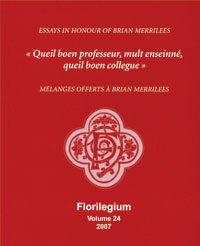Nero, Emperor and Tyrant, in the Medieval French Tradition
Abstract
The emperor Nero is represented in the Middle Ages as a famous example of the cruel tyrant who abused imperial power. In vernacular French literature, various episodes of his life are related, on the basis of classical sources. While some of these individual instances have already been closely studied, this essay focuses on overall assessments of Nero and on two particular episodes which became connected in medieval literature and art: the execution of the apostles Peter and Paul, and Nero's own death. Suetonius's Vita, Boethius's Consolatio Philosophiae, John of Salisbury's Policraticus, Brunetto Latini's Tresor, and the Legenda aurea are significant sources of material on Nero for French writers of the fourteenth and fifteenth centuries.Downloads
Published
2007-01-01
How to Cite
Cropp, G. M. (2007). Nero, Emperor and Tyrant, in the Medieval French Tradition. Florilegium, 24, 21–36. Retrieved from https://journals.lib.unb.ca/index.php/flor/article/view/12562
Issue
Section
Medieval French Literature Across Borders / A travers les frontières


